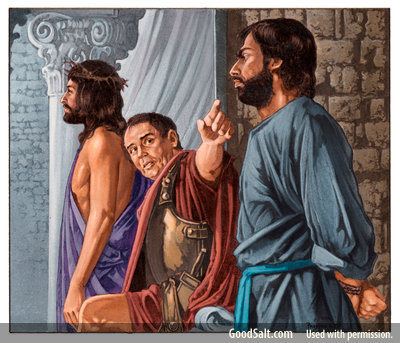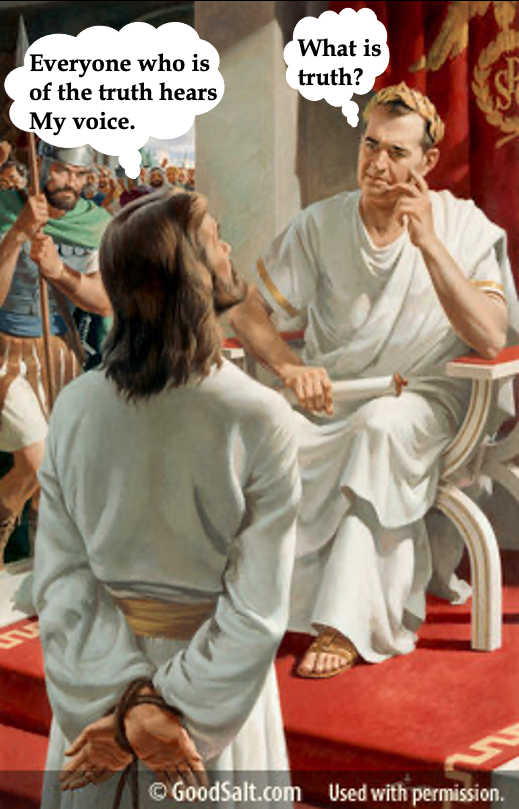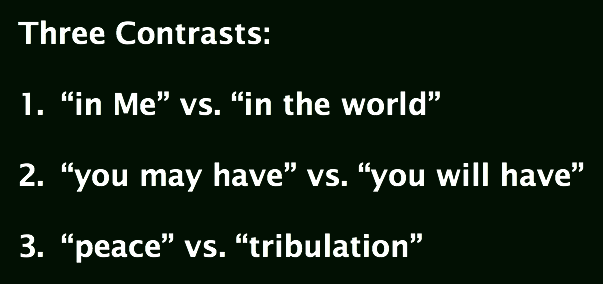“Then they all cried again, saying, ‘Not this Man, but Barabbas!’ Now Barabbas was a robber.” John 18:40
In John 18:28-19:4, we are looking at different responses to Christ crucified. So far we have learned that …
– Like the Jewish leaders, we may refuse to believe in Jesus because of our self-righteous religious pride (John 18:28-32).
– Like Pilate, we may refuse to believe in Jesus because we are too busy with life to truly live (John 18:33-38a).
The third possible way we might respond to Christ crucified is the best way. SIMILAR TO BARABBAS, WE TRUST IN JESUS’ DEATH IN OUR PLACE FOR OUR SINS (John 18:38b-40). When Pilate declared to the Jews, “I find no fault in Him at all” (John 18:38b), it was a reminder that Jesus would die like a Passover lamb, a male in its prime without blemish (cf. Exodus 12:5; I Corinthians 5:7; 2 Corinthians 5:21; Hebrews 4:15; I Peter 3:18). Jesus, the innocent Lamb of God, would die for you and me so we would not have to die forever in the lake of fire (Revelation 20:11-15). But we must come to Jesus on His terms which means believing in Him alone for His gift of everlasting life to escape the eternal punishment of the lake of fire (John 3:36; Revelation 20:15).
Pilate said to the Jews, “39 But you have a custom that I should release someone to you at the Passover. Do you therefore want me to release to you the King of the Jews? 40 Then they all cried again, saying, ‘Not this Man, but Barabbas!’ Now Barabbas was a robber.” (John 18:39-40). Rather than releasing Jesus on the basis of His obvious innocence, Pilate sought to avoid insulting the Sanhedrin by appealing to the Jewish custom of releasing a prisoner during their Passover feast. Pilate’s main concern was to minimize trouble rather than secure justice. If He pronounced Jesus innocent, he would offend the Jewish leaders. But if he pronounced Jesus guilty, he would offend Jesus’ followers. So he tries to satisfy everyone by implying Jesus’ guilt and releasing Him on the basis of the Passover custom.
Pilate puts forward Jesus, whom he rightly calls “the King of the Jews,” and a notorious “robber” named “Barabbas.” Pilate is thinking that this crowd that had just days before spread palm leaves on Jesus’ path and shouted “Hosanna” as He passed (John 12:12-15; cf. Luke 19:28-38) would select Him to be released. But John tells us, “Then they all cried again, saying, ‘Not this Man, but Barabbas!’ ” (John 18:40a). Barabbas was more dangerous to people than to property. He committed murder in connection with insurrection (Mark 15:7; Luke 23:18-19). Barabbas did what Jesus refused to do – take the lead in an armed revolt against Rome. The Jews ignored the obvious innocence of Jesus and freed a murderer. “Don’t miss that the leaders preferred a criminal who had fought for physical deliverance from Rome because that’s all they cared about. They wanted political deliverance from Gentile rule, when what they needed was spiritual deliverance from sin.” 1
Barabbas’ freedom was at Christ’s expense. That is the gospel message. The guilty is released and the innocent is condemned. The Jews were so hostile toward Jesus that they ignored His innocence. Their minds were so made up that the facts about Jesus’ innocence did not matter. Christ did not deserve this condemnation, yet He willingly subjected Himself to it for our sakes (cf. 2 Corinthians 5:21; I Peter 2:22-24; 3:18).
But let’s not overlook how this must have impacted Barabbas. Imagine Barabbas waiting on death row in a Roman prison for the verdict knowing that he could be executed any day. Prisoners didn’t have any rights in those days. It was over for him. There was no hope. He was a murderer who deserved death, and deep down he knew it. Each passing day was one day closer to certain death. He may have been imagining it—the flogging, mocking, and eventual death. It was coming.
And then the day comes. He can hear the shouts ringing throughout the courtyard: “Not this Man, but Barabbas!” Perhaps he was thinking to himself, “They are coming for me.” The guards open the door to his cell and drag him outside. But then something amazing happens. Everyone is celebrating his new freedom. His chains are released, and he is set free. The murderer is set free.
Put yourself in his sandals for a minute. You are walking to your death in chains and then all of a sudden, when you least expect it, you are a free man. Then you hear the words begin: “Crucify Him, crucify Him!” (Mark 15:13-14; Luke 23:21). And you see another man walking by. Those chants are not for you. The guards are dragging another man to his death – Jesus of Nazareth. He is beaten and flogged and is forced to carry His cross to His death. It’s the very cross you had imagined yourself carrying only moments earlier. You think to yourself, that’s my death He’s dying. Barabbas is the one person in history who could say that Jesus literally carried his cross. Jesus took his death, and Barabbas was given the freedom Jesus deserved. Jesus bore the guilt and shame and curse and disgrace and death that Barabbas deserved. Barabbas received the release, the freedom, and the life that Jesus deserved. It was an incredible scene. 2
And the truth is, Barabbas represents all of us. 3 He should have been on the cross instead of Jesus because he was guilty and deserved to die. You may protest, “But I’m not a robber!” But we have all robbed God of His rightful glory and control over our lives. You may come back, “But at least I’m not a murderer!” But Jesus said that if we are wrongfully angry with our brother, we are guilty of murder in God’s sight (Matthew 5:21-22). “But,” you still protest, “I’ve never led an armed rebellion against the government.” True, but we are all rebels against the King of the universe. We have all sinned against God and His rightful rule in our lives.
Also, Barabbas did nothing to earn his pardon. He wasn’t pardoned because of his good behavior or promises to change. If anything, he was pardoned because of how notoriously evil he was. He couldn’t brag after he got out about how he deserved to be pardoned. He couldn’t claim that he was pardoned for his exemplary behavior. In the same way, the Bible says that God justifies the ungodly not through their good works, but by faith alone in Christ alone (Romans 4:4-5). None of us can boast in ourselves when Jesus saves us because our salvation is based on His finished work, not our works (John 19:30; Ephesians 2:8-9).
Jesus died in Barabbas’ place. Barabbas, whose name means “son of the father,” should have been on the cross that day. Instead, the One Who is the eternal Son of the eternal Father hung there in Barabbas’ place. Jesus died in his place – and in your place and mine.
Let me ask you something. Suppose you were a pilot of a plane that became disabled. Your course is headed straight toward a residential area as the plane descends. You have a parachute and could jump to safety, but you must do it at an altitude allowing the plane to crash and kill many. Your other option is to fly the plane and guide it toward a vacant area, but there would be no time to jump to safety. You would die, but others would be spared. Which would you do? Let me tell you what one man did.
Twenty-four-year-old Vinson Kyle Perdue, a United States Air Force pilot, died when his disabled warplane crashed. Instead of parachuting to safety, Perdue apparently stayed with the plane to steer it away from a residential area.
Amy White, who lived near the crash site, was quoted as saying, “I know he went down with that plane so it wouldn’t hit anyone’s house. It would’ve hit my house if he didn’t maneuver that plane.” (Adapted from Dallas Times Herald, August 26, 1981). 4
Jesus Christ could have parachuted and jumped. In other words, He could have escaped His persecutors and refused to die for Barabbas and for us. Instead, He took the punishment for our sins and died so that we could live. He substituted His life in our place.
But Barabbas’ pardon was not automatic. He could have spit in Pilate’s face and said, “I don’t need your pardon! Crucify me!” And, he would have been crucified, while a different prisoner would have been released. In the same way, the pardon that Christ offers to all is only applied to the person who receives it by faith. Jesus promises, “Whoever believes in Him should not perish but have everlasting life.” (John 3:16). Like Barabbas, the guilty rebel, you have got to appropriate by faith the pardon that Christ’s death offers you.
Some people use the word “believe” in our English sense of the word. They mentally assent to the fact Christ died and arose, but they are still depending on their works to get them to heaven. The word “believe” in the Bible means that if a person mentally assents to the fact that Christ died for his or her sins and arose, they trust in Christ alone to get them to heaven. 5
Let me share an illustration. “Picture a luxury liner cruising in the Pacific Ocean. It begins taking on water and lifeboats become a necessity. Three passengers find themselves in different situations. The first has no knowledge that lifeboats save and therefore never steps into one. The second understands that lifeboats save but for some reason refuses to step into one. The third passenger not only understands the ability of a lifeboat to save, but accepts as being true that the lifeboat has the ability to save. The passenger therefore steps into the lifeboat and in so doing relies upon it as the means of salvation.
“Which of the three is saved? The answer is obvious. The last passenger had knowledge and used it. A person is saved when he or she understands the ability Christ has to save and acts on that knowledge by trusting Christ. That is saving faith. One is not saved by simply understanding that Christ died and arose or even mentally assenting to that being a fact of history while depending on one’s good life for salvation. One is saved when as a sinner deserving of hell, one has trusted Christ alone for salvation.” 6
If you have never understood this before, and now you are transferring all your trust onto to Christ alone Who died in your place for all yours sins, you may tell God this through prayer. Keep in mind that praying a prayer is not what gets us to heaven. Only believing or trusting in Christ alone gets us to heaven. This prayer is a way of telling God you are now trusting in His Son.
Prayer: Dear Jesus, I realize that I am like Barabbas. I was hopelessly condemned. I deserved to die on that cross because I have sinned against You with my thoughts, words, and actions. But Your love broke through for me when You bore the curse, the disgrace, the guilt, the shame, and the death that I deserved when You took my place on that cross. You were completely innocent, yet out of love for me, You took the abuse, the beating, the insults, and humiliation that I should have received. Thank You so much for dying in my place and rising from the dead. I am now trusting in You alone, Jesus (not my good life, my prayers, or my religion), to forgive all my sins and give me everlasting life. Thank You for the forgiveness and eternal life I now have. Thank You that I am now free from eternal condemnation and slavery to sin. Use me as You deem best to fulfill Your purposes for Your glory. In Your life-giving name I pray. Amen.

To help you grow in your new relationship with Jesus, please download our digital “Pressing On” discipleship training materials (see above) to go through with others who do not know Jesus as their Savior.
ENDNOTES:
1. Tony Evans, The Tony Evans Bible Commentary, pg. 1821.
2. Dave Furman credits this descriptive scene in his article on March 28, 2018 entitled “We Are Barabbas”at https://www.crossway.org/articles/we-are-barabbas/ to Timothy J. Keller, “Mark 15:1–15, King’s Cross: The Gospel of Mark, Part 2: The Journey to the Cross” (New York: Redeemer Presbyterian Church, March 11, 2007).
3. Adapted from Steve J. Cole’s message on June 7, 2015 entitled, “Lesson 95: What Will You Do With Jesus? (John 18:28-19:16)” at www.Bible.org.
4. R. Larry Moyer, Show Me How To Illustrate Evangelistic Sermons (Grand Rapids: Kregel Publications, 2012) pg. 235.
5. R. Larry Moyer, Free and Clear: Understanding & Communicating God’s Offer of Eternal Life (Grand Rapids: Kregel Publications, 1997), pg. 41.
6. Ibid.







